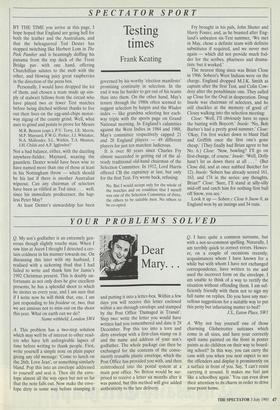SPECTATOR SPORT
Testing times
Frank Keating
BY THE TIME you arrive at this page, 1 hope hoped that England are going hell for both the leather and the Australians, and that the beleaguered Ted Dexter has stopped twitching like Herbert Lom in The Pink Panther and is beamingly doffing his panama from the top deck of the Trent Bridge pay, with one hand, offering Churchillian salutes to the mob with the other, and blowing juicy great raspberries in the direction of the press box.
Personally, I would have dropped the lot of them, and chosen a team made up sim- ply of stalwart fellows from the circuit who have played two or fewer Test matches before being ditched without thanks to live out their lives on the egg-and-chips motor- way zigzag of the county grind. Well, what axes to grind and points to prove for Messrs M.R. Benson (capt.), P.V. Terry, J.E. Morris, M.P. Maynard, P.W.G. Parker, J.J. Whitaker, N.A. Mallender, S.L. Watkin, T.A. Munton,
J.H. Childs and A.P. Igglesden?
Not a bad balance, either, with the dazzling anywhere-fielder, Maynard, wearing the gauntlets. Dexter would have been wise to have named more than one of those at least in his Nottingham throw — which should be his last if there is another Australian wipeout. Can any chairman of selectors have been as vilified as Ted since . . . well, since his immediate predecessor, the hap- less Peter May?
At least Dexter's stewardship has been
governed by his worthy 'election manifesto' promising continuity in selection. In the end it was far harder to get out of his teams than into them. On the other hand, May's tenure through the 1980s often seemed to suggest selection by hatpin and the Wisden index — like grandma selecting her each- way triple with the sports page on Grand National morning. In England's calamities against the West Indies in 1984 and 1988, May's committee respectively capped 21 and 28 England players — 49 different players for just ten matches: ludicrous.
It is over 80 years since Charles Fry almost succeeded in getting rid of the al- ready traditional old-hand chairman of the Selection Committee. In 1912, Lord Harris offered CB the captaincy at last, but only for the first Test. Fry wrote back, refusing:
No. But I would accept only for the whole of the matches and on condition that I myself was one of the Selection Committee of three, the others to be suitable men. No others to be co-opted.
Fry brought in his pals, John Shuter and Harry Foster, and, as he boasted after Eng- land's unbeaten six-Test summer, 'We met in May, chose a definite team with definite substitutes if required, and we never met again — which did not provide much fod- der for the scribes, pharisees and drama- tists: but it worked.'
The nearest thing since was Brian Close in 1966. Sobers's West Indians were on the charge. England dropped M.J.K. Smith as captain after the first Test, and Colin Cow- drey after the penultimate one. They called up Close for the Oval in desperation. Doug Insole was chairman of selectors, and he still chuckles at the memory of good ol' Closey walking into the selection meeting:
Close: 'Well, I'll obviously have to open the batting with Boycott.' Insole: 'No, Bob Barber's had a pretty good summer.' Close: 'Okay, I'm first wicket down to blunt Hall and Griffith once the first one's gone cheap.' (They finally had Brian agree to bat No. 6.) Close: 'Now, bowling? I'll go on first-change, of course.' Insole: 'Well, Dolly hasn't let us down there at all . . . ' (But Close did, and at once nabbed Butcher for 12). Insole: 'Sobers has already scored 161, 163, and 174 in the series: any thoughts, Brian?' Close: 'Sure, I'll stand at silly-silly mid-off and catch him for nothing first ball off Snow, you see.'
Look it up — Sobers c Close b Snow 0, as England won by an innings and 34 runs.


















































 Previous page
Previous page